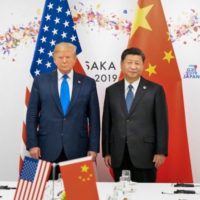-
Who deserves the Nobel Peace Prize in a time of pandemic?
A few weeks ago, I was talking to Noam Chomsky about the state of the world. At one point, Noam smiled and said that he is not aware of any German doctors in Italy, even though both countries are in the European Union; instead, Cuban and Chinese doctors went to Italy to help the Italians fight the global pandemic.
-
Freedom Rider: Rebellion, confusion, scoundrels and Kente cloth
Black rebellion brings insecurity to those in power, as editors, mayors and even long dead criminals are being called to account.
-
Power over policing
Reform efforts will fail. Only a power shift to communities can improve public safety.
-
Top 16 euphemisms U.S. headline writers used for police beating the shit out of people
“Mayor Downplays Rough Police Treatment of NYC Protesters” (AP, 6/5/20)
-
China suspends debt repayment for 77 developing nations, regions
China has announced the suspension of debt repayment for 77 developing countries and regions as the nation is working with other G20 members to carry out the G20 debt relief initiative for low-income countries, Chinese officials said at a press briefing at the State Council Information Office on Sunday.
-
Gautam Navlakha’s struggle for justice
Indian activist and journalist Gautam Navlakha is in prison as part of what many observers have termed a crackdown on dissent in India. The 68-year-old has been fighting a years-long legal battle against the Indian state.
-
We crunched the numbers: Police — not protesters — are overwhelmingly responsible for attacking journalists
WE ARE WITNESSING a truly unprecedented attack on press freedom in the United States, with journalists are being systematically targeted while covering the nationwide protests over the killing of George Floyd by Minneapolis police.
-
From George Floyd back to the structural violence of capitalism
Across the country—in city after city—the people have erupted in righteous indignation to George Floyd’s recorded lynching. His extrajudicial murder set off a rebellion that had been primed by the highly publicized white-vigilante murder of Ahmaud Arbery and the botched, “no-knock” police raid that killed Breonna Taylor in her bed.
-
The treason of the ruling class
They have destroyed our capitalist democracy and replaced it with a mafia state.
-
Louisville Police left the body of David McAtee on the street for 12 hours
To lose your job when someone has died at your hands is a small price to pay.
-
The murder of George Floyd is normal in an abnormal society
There is no need to wonder why George Floyd (age 46) was murdered in broad daylight in Minneapolis, Minnesota, on May 25, 2020. The script of his death is written deep in the ugly drama of U.S. history.
-
Taiwan and WHO in the COVID-19 pandemic
The ruling establishment’s intrigue against the WHO might seem at odds with Taiwan’s failed bid to join the World Health Assembly (WHA) this past May, but there was no contradiction between Taiwan being seen fighting a David and Goliath-like battle with both the WHO and China, thereby flaring up geopolitical tensions from without. Both served the interests of the ruling class of Taiwan.
-
The blue plague and black death
George Floyd’s death by Blue Plague in Minneapolis was widely condemned by the same parties that have encouraged and funded the spread of the fatal contagion.
-
How many dead Yemenis does it take to equal one Washington Post contributor?
The War Nerd dissects reporting on Saudi Arabia to show how the corporate media cares more about a dead Washington Post columnist than a quarter of a million Yemenis killed in a Western-backed war.
-
Killer Mike – “Reagan” (Official Music Video)
The hyper-political R.A.P. Music track gets a hyper-political animated video.
-
American exceptionalism and the American Left’s China double standard
The threat that the American Left sees in China aligns with the white supremacist underpinnings of American exceptionalism.
-
What are the three concurrent crises of the coronavirus depression?
The Keynes crisis, the Minsky crisis and the Means crisis
-
The Bouficha appeal against the preparations for war
On 23 March, the UN Secretary General António Guterres called for a ceasefire. ‘The fury of the virus’, he said, ‘illustrates the folly of war’. In a recent report, the Armed Conflict Location & Event Data Project (ACLED) wrote that the ‘call for a global ceasefire has not had the desired result’.
-
Engels was right, class society and women’s oppression aren’t inevitable or irreversible
There is a view of human history which holds effectively that there is little difference in essentials between modern, capitalist society and the societies of the past.
-
Pandemic: How big banks and big AG share blame
Here in the U.S., agribusiness lines up with pharmaceutical and military contractors in terms of being a political force to be reckoned with and, in effect, help run the country. Their needs are protected so that these pathogens have the best lawyers on the planet.

![Oslo City Hall - The place where the Nobel Peace Prize is presented Oslo City Hall (Norwegian: Oslo rådhus) houses the city council, city administration, and art studios and galleries. The construction started in 1931, but was paused by the outbreak of World War II, before the official inauguration in 1950. Its characteristic architecture, artworks and the Nobel Peace Prize ceremony, held on 10 December, makes it one of Oslo's most famous buildings. It was designed by Arnstein Arneberg and Magnus Poulsson. The roof of the eastern tower has a 49-bell carillon which plays every hour. It is situated in Pipervika in central downtown Oslo. The area was completely renovated and rebuilt to make room for the new city hall, back in the late 1920s. In June 2005 it was named Oslo's "Structure of the Century" [Wikipedia.org]](https://mronline.org/wp-content/uploads/2020/06/29879653935_b62010aaca_c-200x200.jpg)


















